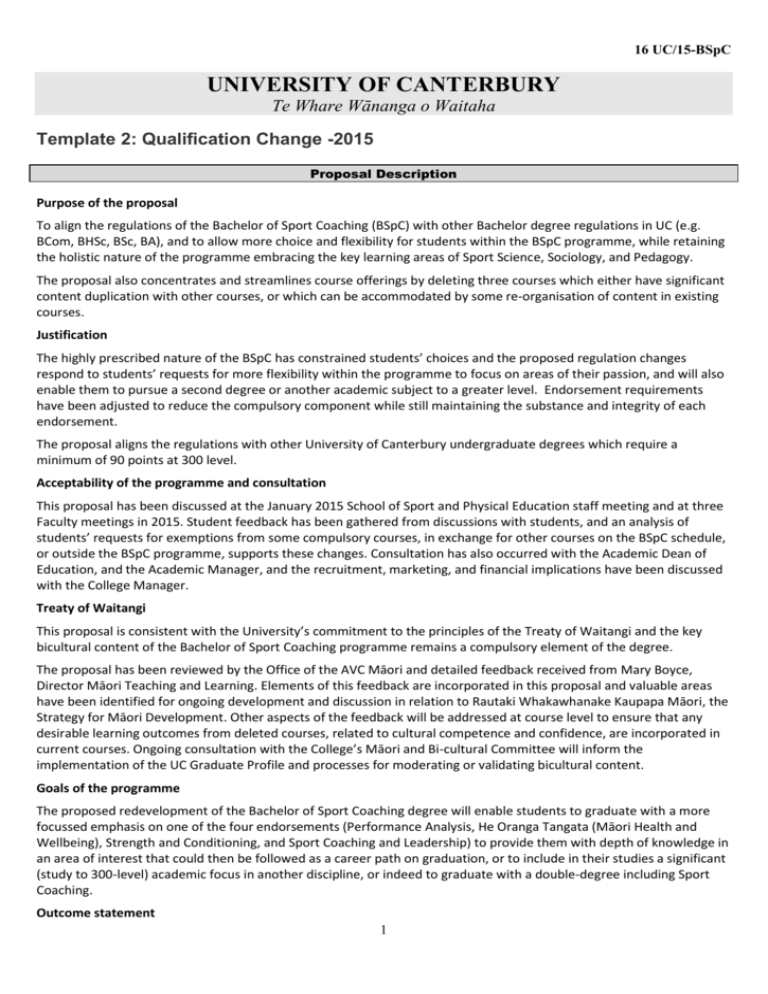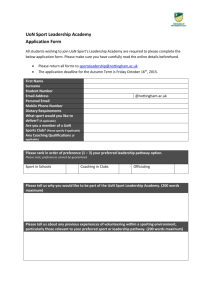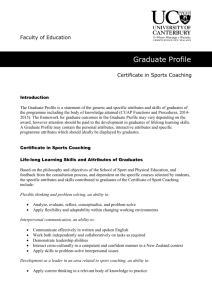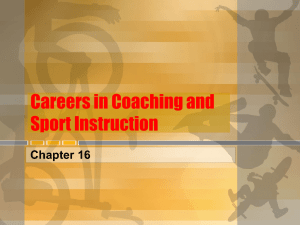Bachelor of Sports Coaching
advertisement

16 UC/15-BSpC UNIVERSITY OF CANTERBURY Te Whare Wānanga o Waitaha Template 2: Qualification Change -2015 Proposal Description R Purpose of the proposal To align the regulations of the Bachelor of Sport Coaching (BSpC) with other Bachelor degree regulations in UC (e.g. BCom, BHSc, BSc, BA), and to allow more choice and flexibility for students within the BSpC programme, while retaining the holistic nature of the programme embracing the key learning areas of Sport Science, Sociology, and Pedagogy. The proposal also concentrates and streamlines course offerings by deleting three courses which either have significant content duplication with other courses, or which can be accommodated by some re-organisation of content in existing courses. Justification The highly prescribed nature of the BSpC has constrained students’ choices and the proposed regulation changes respond to students’ requests for more flexibility within the programme to focus on areas of their passion, and will also enable them to pursue a second degree or another academic subject to a greater level. Endorsement requirements have been adjusted to reduce the compulsory component while still maintaining the substance and integrity of each endorsement. The proposal aligns the regulations with other University of Canterbury undergraduate degrees which require a minimum of 90 points at 300 level. Acceptability of the programme and consultation This proposal has been discussed at the January 2015 School of Sport and Physical Education staff meeting and at three Faculty meetings in 2015. Student feedback has been gathered from discussions with students, and an analysis of students’ requests for exemptions from some compulsory courses, in exchange for other courses on the BSpC schedule, or outside the BSpC programme, supports these changes. Consultation has also occurred with the Academic Dean of Education, and the Academic Manager, and the recruitment, marketing, and financial implications have been discussed with the College Manager. Treaty of Waitangi This proposal is consistent with the University’s commitment to the principles of the Treaty of Waitangi and the key bicultural content of the Bachelor of Sport Coaching programme remains a compulsory element of the degree. The proposal has been reviewed by the Office of the AVC Māori and detailed feedback received from Mary Boyce, Director Māori Teaching and Learning. Elements of this feedback are incorporated in this proposal and valuable areas have been identified for ongoing development and discussion in relation to Rautaki Whakawhanake Kaupapa Māori, the Strategy for Māori Development. Other aspects of the feedback will be addressed at course level to ensure that any desirable learning outcomes from deleted courses, related to cultural competence and confidence, are incorporated in current courses. Ongoing consultation with the College’s Māori and Bi-cultural Committee will inform the implementation of the UC Graduate Profile and processes for moderating or validating bicultural content. Goals of the programme The proposed redevelopment of the Bachelor of Sport Coaching degree will enable students to graduate with a more focussed emphasis on one of the four endorsements (Performance Analysis, He Oranga Tangata (Māori Health and Wellbeing), Strength and Conditioning, and Sport Coaching and Leadership) to provide them with depth of knowledge in an area of interest that could then be followed as a career path on graduation, or to include in their studies a significant (study to 300-level) academic focus in another discipline, or indeed to graduate with a double-degree including Sport Coaching. Outcome statement 1 16 UC/15-BSpC The Bachelor of Sport Coaching degree provides a programme through which graduates can develop skills and competencies to gain employment in a wide range of professions as well as within a sporting context. The practicums and internship students complete during the degree will enable each to apply their learning and knowledge in real work settings. The endorsements will enable graduates to develop specialist knowledge in Sport Coaching and Leadership, He Oranga Tangata (Māori Health and Wellbeing), Performance Analysis, and Strength and Conditioning– alongside the generic skills they will develop. Graduates will gain, or further develop, the confidence to challenge current practice and participate in the development of new and innovative best practice. Graduates will be equipped for postgraduate study in sport coaching and exercise science, and for employment within the field of sport in a range of roles or, using their generic skills, for employment in another field of interest. In a sporting context graduates advance to the highest levels within organisations, becoming leaders in sport development roles, head coaches for professional teams, and chief executive officers (CEOs) within sports organisations. In addition to these types of high profile positions within sport, ad-hoc research into the work destinations of our graduates shows clearly that the students learn key skills providing them with a range of career options outside sport. As a result of these key career skills graduates of the degree can also follow a similar trajectory within other career pathways, reaching management and CEO roles. Graduate profile Alignment with the UC graduate profile The UC Graduate Profile embodies a set of attributes common to all UC undergraduate programmes, and represents a clear statement of what distinguishes UC graduates. The attributes build on characteristics valued by employers and communities, and support the university’s overarching goal to produce graduates who are prepared to make a difference in the world. In the context of the Bachelor of Sport Coaching these attributes will be achieved through the following strategies: Produce students who are biculturally competent and confident: The core course, SPCO101, Introduction to Sport Coaching contains explicit bicultural content towards enhancing bicultural competence of our students. In addition, at 200-level, all BSpC students complete the course SPCO208, Critical and Bicultural Perspectives in Sport Coaching, to further enhance their bicultural capabilities and understandings through three field trips, including a visit to a marae to further enhance their knowledge of the Treaty of Waitangi and its relevance in modern Aotearoa/New Zealand. At the start of their studies, all year 1 students are welcomed into the BSpC programme through a mihi whakatau where the year 2 students welcome the manuhiri into the programme. Finally, year 2 students complete a noho marae experience, concluding in the mihi whakatau back on campus. Produce students who are engaged with the community: The core course, SPCO101 includes supervised micro coaching sessions with local schools which provides contact and experience with the wider community. Year 1’s practicum pairs sport coaching students with Sport Canterbury and local primary schools, and in year 3 students coach a team or squad of their choosing. Several other compulsory courses include micro coaching sessions and engagement with other community organisations. Produce students who are globally aware: Courses in the Bachelor of Sport Coaching schedule address international issues, from multicultural understandings to practises in different nations, and examples of sporting practice which are internationally observed. This includes the course SPCO105 Social History of Sport and Physical Education, and SPCO207 Attitudes and Values in Sport where sport is viewed through various lenses of society, and the interaction of sport and society are explored through contemporary examples. Produce students who are innovative and work-ready: A particular strength of the Bachelor of Sport coaching programme is the development in students of transferrable skills which are immediately valuable in the professional workplace. This is in the form of presentations for course assessments, developing team-working and communications skills, written reports, examinations and submitted portfolios detailing longer-term projects. In practicums, students work within schools or sporting organisations to gain an understanding of professional practice honing communication and leadership skills, and other courses deal with interpersonal communications, planning, and group management. The year 3 Internship sees students placed in professional 2 16 UC/15-BSpC sporting organisations for at least 120 hours to learn about the management structures and day-to-day worklife of their host, and to produce a body of work during their placement. Based on the philosophy and objectives of the degree the specific attributes and skills expected of graduates from the Bachelor of Sport Coaching are as follows: Critical Thinking and Problem Solving, an ability to: • Initiate and innovate • Analyse, evaluate, reflect, conceptualise, and problem solve • Critically evaluate research and current best practice • Apply flexibility and adaptability within changing working environments Interpersonal Communication, an ability to: • Communicate effectively in written and spoken English • Work both independently and collaboratively on tasks as required • Provide quality leadership • Interact cross-culturally in a competent and confident manner in a New Zealand context • Apply skills to problem solve interpersonal issues Development as a Professional, an ability to: • Extend current thinking in a relevant body of knowledge and apply this in practice • Analyse and evaluate own performance, and take responsibility for ensuring quality outcomes • Plan for and organise continued professional development • Maintain a commitment to lifelong learning and development • Conceptualise ethical issues and manage them in accordance with professional ethics • Work within and help develop administrative policies and procedures with professional integrity • Work effectively within a multicultural environment Programme overview The Bachelor of Sport Coaching is structured around a common core that flows throughout the degree (a blend of sociocultural, pedagogical, and bio-physical elements which is true to the philosophy of the School of Sport and Physical Education) and an area of endorsement selected by students at the end of Year one and followed for Years two (200 level) and three (300 level) of the degree programme. All full-time students complete the following courses in Year one of the degree; SPCO101, SPCO102, SPCO104, SPCO105, SPCO110 and three optional courses selected from either the BSpC schedule or from any other UC Degree schedule. In Year two all students take the following core courses; SPCO201, SPCO208, SPCO209 and in Year three the common core is SPCO302 and SPCO320. Students will also take compulsory courses specific to their chosen endorsement. Deletion of courses The following courses, which are presently compulsory courses within endorsements of the current Bachelor of Sport Coaching, are proposed for deletion. 1. SPCO202 Coaching and Learning 2. This core compulsory course will be replaced by SPCO201 Athlete-Centred Coaching. Content will be revised and enhanced informed by the expertise of Professor Richard Light, a world expert on athlete-centred and games-based approaches to sport coaching, as Head of School of the School of Sport and Physical Education. 2. SPCO232 Motor Learning and Performance. This is currently a compulsory course for the Performance Analysis endorsement. Most of the Learning Objectives are met at least in part by the course SPCO201 Athlete-Centred Coaching which is proposed to be a core compulsory course. 3. SPCO342 Rehabilitation and Reconditioning for Sports Performance. This is currently a compulsory 300-level course for the Strength and Conditioning endorsement. This course will be replaced by the popular optional course SPCO221 Sport Injuries and their Management which has been taught at UC for some years. SPCO221 meets most of the Learning Objectives of SPCO342, and can be enhanced to cover all of the LOs. Deletion of these courses increases efficiency by reducing overlapping courses and focusing resources more effectively. 3 16 UC/15-BSpC Proposed teaching/delivery methods Teaching will vary by course and department and will be appropriate to best pedagogical practice and culturally responsive pedagogies. Courses will generally involve a mixture of lectures and workshops or laboratory sessions. All students complete an introductory practicum in year 1; and at least one further applied practicum in their area of endorsement. Additionally, in Year three students will undertake an internship within the area of the specialisation. Courses will be delivered using a range of pedagogies moving students as they progress through the degree towards more self-directed and independent group and individual assignments requiring increasing levels of research and critical analysis. Prescriptions for courses This proposal involves a change to the compulsory nature of currently-existing courses – there are no new courses proposed. Assessment and moderation procedures Assessment procedures will include a combination of: Individual tests and exams (invigilated and take-home), Group and individual projects, Group and individual presentations, Literature reviews, Video analysis projects, Essays, Practicums, Internships, Laboratory reports and Research projects Each course co-ordinator will be responsible for the choice of assessment. The Programme Co-ordinator will review teaching methods and assessment procedures to ensure they are consistent with best practice in tertiary education and that learning objectives are met. The School will develop an Assurance of Learning Programme for this qualification that will identify and measure the learning objectives specified for the programme. The School teaching team will be the examiners for nearly all courses, with the exception of the HLTH and MAOR courses offered by the School of Health Sciences and School of Māori and Indigenous Studies respectively. For these courses the Programme Co-ordinator will consult and advise with the Course Co-ordinators and examiners in the appropriate school. Resources The resource requirements remain the same. Plans for monitoring programme quality A separate programme committee will be established that will review the content of the programme on a regular basis. Pre and post course meetings will be held with all teaching staff and chaired by the Head of School. Student evaluations will be mandatory for all courses, and will be administered through the Centre for Evaluation and Monitoring at the University of Canterbury. Review of the programme The programme will be subject to Graduating Year Reviews. Graduating students will also be interviewed to assess programme satisfaction. Graduate employers will be contacted to ensure that graduates have industry-required skills and dispositions. Calendar Form Qualification Regulations UC Calendar 2015 Page 264 Replace the current Regulations with Regulations for the Degree of Bachelor of Sport Coaching The Degree of Bachelor of Sport Coaching (BSpC) These award regulations should be read in conjunction with General Course and Examination Regulations 1. Entry Requirements 4 16 UC/15-BSpC a) Admission to the BSpC shall be subject to the approval of the Dean of Education. b) Before enrolling in a course of study for the degree, candidates must meet the University admission requirements as listed in Admission Regulation A. Note: 1. Candidates are required to be vetted by police. 2. The Structure of the Programme a) Subjects for the Degree: The degree of the Bachelor of Sport Coaching is awarded with an endorsement in: i) He Oranga Tangata ii) Leadership iii) Performance Analysis iv) Strength and Conditioning Note: Details of endorsement requirements are given in schedules A and B for this degree b) Structure of the Degree: i) To qualify for the Bachelor of Sport Coaching a candidate must pass courses having a value of at least 360 points; and of these 360 points: a. At least 225 points must be for courses above 100-level; and b. At least 90 points must be for courses at 300-level; and c. At least 255 points must come from courses listed in Schedule C to these regulations (Bachelor of Sport Coaching Course Schedule) d. Up to 105 points (the balance of 360 points) may be for courses from any degree of the University of Canterbury. These courses will be subject to the Regulations for the other degree ii) Candidates must also meet the following conditions: a. At least 150 points must come from courses listed in Schedule A to these regulations (Core courses) b. One endorsement must be met through the completion of the specified courses in Schedule B to these regulations (Endorsement requirements) iii) Further to Regulation b (i) and (ii) all candidates must meet the following non-credit requirements: a. On-campus students are required to attend a mihi whakatau and marae experience as part of the Year 1 and 2 programmes. b. Students studying by distance will discuss their options with the School staff to determine what their requirements are for mihi whakatau and marae experience or equivalent, depending on location. c. All students must hold a current First Aid certificate prior to undertaking coaching practicums 2 and 3. 3. Time Limits a) The usual period to complete this qualification for a full-time candidate is three years. b) Any candidate whether part-time of full-time must complete the qualification within six years of enrolling in the first course. c) The Dean of Education may extend this time limit in special circumstances and may make further conditions including a requirement to take additional coursework to comply with updated requirements. 4. Credit for Study for Other Qualifications a) The Dean of Education may grant credit from any tertiary or other qualification provided that the content and standard of such study are considered appropriate to the degree. b) Such credit i) may be specified or unspecified; and ii) must not exceed a maximum of 120 points from a completed degree; or iii) must not exceed 240 points from an incomplete degree, diploma or other tertiary qualification. 5 16 UC/15-BSpC 5. Transfer of Earlier Credit a) Course passed from the Bachelor of Sport Coaching Schedule may be transferred to the Certificate in Sport Coaching provided that the: i) courses have not been credited to another completed qualification ii) courses were passed within the five years prior to starting the first course in the Certificate iii) course of study will satisfy the requirements detailed under Regulation 2. Structure of the Programme. b) Any courses that are transferred this way will not be available for credit to the Bachelor of Sport Coaching at a later date. 6. Transfer of Credit to the Bachelor of Sport Coaching or Other Qualifications a) With the approval of the Dean of Education any courses passed towards the Certificate in Sport Coaching, less than the completed qualification may be credited towards a Bachelor of Sport Coaching degree provided that enrolment in the certificate then lapses. Courses transferred under this Regulation must comply with all Regulations of the Bachelor of Sport Coaching including the specified time-limits. b) No credit is available for cross-crediting to the Bachelor of Sport Coaching from a completed Certificate. Courses passed towards the Certificate may be used for the purposes of prerequisites and endorsement requirements in a subsequent Bachelor of Sport Coaching degree provided they have been completed within the maximum completion timeframe for the Bachelor of Sport Coaching. c) Transfer of credits from an incomplete Certificate to another award of the University will be subject to the Regulations of that award. d) Transfer of credits from a completed Certificate to another award of the University will be subject to the determination of the appropriate Dean. Note that a Certificate is considered completed when the student graduates with the certificate Schedule A to the Bachelor of Sport Coaching (Core Courses) The following information outlines the common core requirements all students in the Bachelor of Sport Coaching degree. For full course information, go to www.canterbury.ac.nz/courses Level 100-level: 200-level: 300-level: Requirements 75 points comprised of: SPCO101, SPCO102, SPCO104, SPCO105, SPCO110 45 points comprised of: SPCO201, SPCO208, SPCO209 30 points comprised of: SPCO302, SPCO320 Schedule B for the Bachelor of Sport Coaching (Endorsement Requirements) The following information outlines the additional requirements for the individual endorsements. These requirements are in addition to Schedule A and prescribe all the required courses for each Endorsement. For full information, go to www.canterbury.ac.nz/courses. Endorsement He Oranga Tangata Leadership Requirements 200-level: 60 points comprised of MAOR212, MAOR219, MAOR270, SPCO210 300-level: 75 points comprised of HLTH306, MAOR370, SPCO305 100 level: 15 points comprised of MGMT100 6 16 UC/15-BSpC Endorsement Performance Analysis Strength and Conditioning Requirements 200-level: 45 points comprised of SPCO207, SPCO210, MGMT208 300-level: 60 points comprised of SPCO301, SPCO305, SPCO308, SPCO310 200-level: 45 points comprised of SPCO204, SPCO210, SPCO231 300-level: 60 points comprised of SPCO304, SPCO310, SPCO331, SPCO332 100-level: 15 points comprised of SPCO107 200-level: 45 points comprised of SPCO221, SPCO241, SPCO242 300-level: 60 points comprised of SPCO309, SPCO310, SPCO341, SPCO343 Schedule C for the Bachelor of Sport Coaching (All Courses) For full course information, go to www.canterbury.ac.nz/courses Course Code SPCO101 SPCO102 SPCO103 SPCO104 Course Title Introduction to Sport Coaching Coaching & Learning 1 Sport Psychology Introduction to Human Anatomy and Physiology Social History of Sport Sport Nutrition Practicum 1 Athlete-Centred Coaching Introduction to Biomechanics EFTS 0.125 0.125 0.125 0.125 15 S1 S2 S2 S1 0.125 S1 0.125 0.125 0.125 W S2 S1 0.125 0.125 S2 S1 SPCO209 SPCO210 SPCO221 Attitudes and Values in Sport Critical and Bicultural Perspectives in Sport Coaching Exercise Physiology Practicum 2 Sport Injuries and Their Management 0.125 0.125 0.125 SPCO222 Analysis of Expeditioning 0.125 SPCO223 Sport Psychology 2 0.125 S2 P: SPCO104 A/W P: SPCO110 S2 P: SPCO104 or 30 points in appropriate courses with the approval of the Programme Coordinator S2 P: SPCO104 or or 45 points in appropriate courses with the approval of Programme Coordinator S1 P: SPCO103 or or 45 SPCO105 SPCO107 SPCO110 SPCO201 SPCO204 SPCO207 SPCO208 7 P/C/R/RP/EQ P: SPCO101 or 102 P: SPCO104 or 45 points in appropriate courses approved by the Programme Coordinator P: SPCO105 P: SPCO105 16 UC/15-BSpC Course Code Course Title EFTS SPCO224 Sport Management 0.125 SPCO231 Introduction to Performance Analysis 0.125 SPCO241 Introduction to Strength and Conditioning 0.125 SPCO242 Weight Management 0.125 SPCO301 Sport Coaching and Leadership 0.125 SPCO302 Coaching and Learning 3 0.125 SPCO304 Biomechanics 2 0.125 SPCO305 Sociology of Sport Coaching 0.125 SPCO308 SPCO309 Athletes with Disabilities Exercise Physiology 2 0.125 0.125 SPCO310 SPCO320 Practicum 3 Internship 0.125 0.125 8 15 P/C/R/RP/EQ points in appropriate courses with the approval of Programme Coordinator S2 P: 15 points in Sport Coaching schedule or 45 points in appropriate courses with the approval of Programme Coordinator S2 P: 45 points in any courses at 100-level and approval by Programme Coordinator. S2 P: 45 points in any courses at 100-level and approval by Programme coordinator. S2 P: 45 points in any courses at 100-level and approval by Programme Coordinator. RP: A strong secondary science background. S2 P: SPCO201 or SPCO202 S1 P: SPCO201 or SPCO202 S1 P: SPCO204 and SPCO231, or 30 points at 200-level MATH or PHYS and approval from Programme Coordinator S1 P: SPCO207 and SPCO208 S2 P: SPCO202 S1 P: SPCO209 or with approval from Programme Coordinator A/W P: SPCO210 S2 P: Successful completion of required 100 level 16 UC/15-BSpC Course Code Course Title EFTS 15 SPCO331 Performance Analysis 2: Tools and Techniques 0.125 S2 SPCO332 Applied Performance Analysis 0.125 S2 SPCO341 Strength and Conditioning for Sport Performance 0.125 S1 SPCO343 Nutrition and Recovery for Sports Performance 0.125 S2 HLTH306 0.250 S1 MAOR212 Te Kete Hauora – Māori Health Knowledge and Understanding Practicum Māori and Indigenous Development 0.125 S1 MAOR219 Te Tiriti: The Treaty of Waitangi 0.125 S2 MAOR270 Te Ao Hauora Tangata: Māori Health 0.125 S2 9 P/C/R/RP/EQ and 200 level courses from the Sport Coaching schedule P: SPCO231 or with approval from Programme Coordinator P: SPCO231 and SPCO232 P: SPCO241 or with approval from Programme Coordinator SPCO242 or with approval from Programme Coordinator RP: HLTH301 P: Any 15 points in 100 level course in Aotahi: School of Māori and Indigenous Studies or or 30 points in 100 level courses in Arts, Education, Fine Arts, Music, and Social Work, or by permission of the Head of School. R: HIST262, HIST379. EQ: HIST262 P: Any 15 points in 100 level course in Aotahi: School of Māori and Indigenous Studies or or 30 points in 100 level courses in Arts, Education, Fine Arts, Music, and Social Work, or by permission of the Head of School. R: POLS218, POLS258, HIST268, SOCI209, HSRV207. EQ: HIST268, SOCI209, POLS258, HSRV207 P: Any 15 points in 16 UC/15-BSpC Course Code Course Title Perspectives EFTS 15 MAOR370 Māori Health Promotion, Policy and Practice 0.250 S2 MGMT100 MGMT208 Fundamentals of Management Principles of Leadership 0.125 0.125 S2 S2 10 P/C/R/RP/EQ 100 level course in Aotahi: School of Māori and Indigenous Studies or or 30 points in 100 level courses in Arts, Education, Fine Arts, Music, and Social Work, or by permission of the Head of School. P: Any 15 points in 200 level course in Aotahi: School of Māori and Indigenous Studies or or 30 points in 200 level courses in Arts, Education, Fine Arts, Music, and Social Work, or by permission of the Head of School. (1) MGMT100; and (2) A further 15 points in MGMT or MKTG or MSCI or STAT







